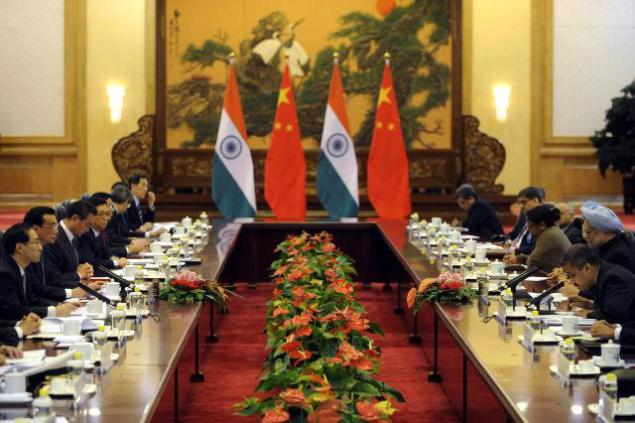Beijing, October 23: Seeking to defuse recurring border stand-offs, India and China on Wednesday inked a comprehensive pact which commits them not to use military capability to attack each other but a deal on a liberalised visa regime could not be signed with India strongly opposing China’s stapled visa policy.
Under a Border Defence Cooperation Agreement (BDCA) signed after extensive talks between Prime Minister Manmohan Singh and his Chinese counterpart Li Keqiang here, the two neighbours also agreed not to tail each other’s patrol along the Line of Actual Control (LAC) which has witnessed numerous incursions by Chinese troops at Depsang Valley in Ladakh.
The BDCA facilitates the establishment of a hotline between the military headquarters of the two countries and meeting sites for border personnel in all sectors of the 4000-km LAC.
The talks between the two premiers at the Great Hall of the People lasted over three hours. Dr. Singh and Mr. Li met for the second time this year for “fruitful and productive” discussions.
Nine agreements signed
In all, nine agreements, including the BDCA and one on strengthening cooperation on trans-border rivers, were signed after restricted and delegation-level talks.
But as expected, there was no agreement on liberalising the visa regime, which the Chinese side was very keen on but India was not in the wake of a controversy over stapled visas issued by the Chinese Embassy to two Indian archers from Arunachal Pradesh.
During the talks, India objected to stapled visas issued by China to residents of some Indian states over whose parts Beijing has laid claim.
Visa regime issue
Dr. Singh pledged his commitment to easing the visa regime to facilitate the travel of Chinese nationals.
He told the media after the talks that he had “conveyed to Premier Li our commitment to visa simplification to facilitate travel of Chinese nationals to India and expressed the hope that China will also facilitate such exchanges“.
Ahead of the visit, there were indications that an agreement on a liberalised visa regime was close to being signed between the countries.
But upset by the issue of stapled visas to residents of Arunachal Pradesh, India decided to defer the issue in a virtual tit-for-tat.
Sources said the agreement will be signed “some day” but India has decided to “slow down things” for the moment.
Refusing to go into the details of what was discussed in the meeting between the two prime ministers, Foreign Secretary Sujatha Singh said in response to questions at a news briefing that the issue of stapled visas had come up.
“It will be under discussion,” she said when she was asked whether the Chinese had given assurances that they would not resort to such a practice in future.
Arunachal Pradesh issue
The Foreign Secretary asserted that Arunachal Pradesh is an integral part of India but refused to go into details of the discussions. “I have told you what we can share with you at this moment,” she said.
The two premiers told the media the fact that they met twice in a single calendar year, the first time this has happened since 1954, reflected the significance of the strategic relationship between the two countries. The agreements signed today will inject a new dynamism in the ties, they said.
The four-page BDCA, signed by Defence Secretary R K Mathur and PLA Deputy Chief of General Staff Lt Gen Sun Jianguo, has 10 clauses that seek to maintain peace, tranquillity and stability along the 4,000-km LAC.
It reiterates that neither side shall its use its military capability against the other and that their respective military strengths shall not be used to attack the other side.
It reaffirms that neither side shall use or threaten to use force against the other side by any means or seek equal security.
Affirming that the two sides would continue implementing confidence—building measures in the military field along the LAC, the BDCA stated they would consider establishing a hotline between their military headquarters and specific arrangements for this will be decided through mutual consultations.
The two sides agreed that they shall not follow or tail patrols of the other side in areas where there is no common understanding of the LAC, and in case of a doubtful situation, clarifications will be sought and got through established mechanisms.

